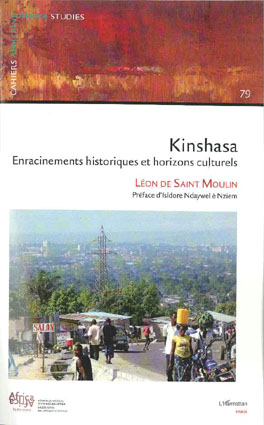Histoire/société

HISTOIRE | Mars 2012
Kinshasa

Edition : Harmattan (L’)
Pays d’édition : France
ISBN : 978-2-296-96924-7
Pages: 364
Prix : 37.50
Parution : 01 Mars 2012
Français
Enracinements historiques et horizons culturels
Léon De Saint Moulin
Cette étude séduit par son ambition de montrer à la fois l’enracinement profond de l’histoire de Kinshasa dans le passé précolonial et colonial, et, d’autre part, les horizons de la perception sociale et les valeurs de la population qui a vécu cette histoire. Son intérêt culmine dans le dessein de proposer une vision de l’homme et de la société dans une démarche totalisante souvent ignorée par ses devanciers. Fondées sur des enquêtes de terrain, les analyses éclairent le vécu et le perçu de l’univers social de la capitale du Congo. L’ouvrage constitue une référence à recommander à tous ceux qui ont le souci de mieux comprendre cette bouillonnante, inventive et récalcitrante ville de Kinshasa pour déchiffrer les logiques, les rationalités et les valeurs qui fondent sont dynamisme.
On visitera dans ce volume les anciens villages de Kinshasa et les traces qu’ils laissent dans la mémoire collective. À travers une patiente sociographie de la ville et de ses quartiers, on percevra mieux les préoccupations des Kinois d’aujourd’hui : démocratie, justice, éducation, eau et électricité… On apprendra ainsi à relativiser les problèmes ethniques et les impressions trompeuses de la déchéance d’un âge d’or, plus ou moins imaginaire, qui marquent trop souvent les discours sur la RDC.
Préface d’Isidore Ndaywel é Nziem
Léon De Saint Moulin
Cette étude séduit par son ambition de montrer à la fois l’enracinement profond de l’histoire de Kinshasa dans le passé précolonial et colonial, et, d’autre part, les horizons de la perception sociale et les valeurs de la population qui a vécu cette histoire. Son intérêt culmine dans le dessein de proposer une vision de l’homme et de la société dans une démarche totalisante souvent ignorée par ses devanciers. Fondées sur des enquêtes de terrain, les analyses éclairent le vécu et le perçu de l’univers social de la capitale du Congo. L’ouvrage constitue une référence à recommander à tous ceux qui ont le souci de mieux comprendre cette bouillonnante, inventive et récalcitrante ville de Kinshasa pour déchiffrer les logiques, les rationalités et les valeurs qui fondent sont dynamisme.
On visitera dans ce volume les anciens villages de Kinshasa et les traces qu’ils laissent dans la mémoire collective. À travers une patiente sociographie de la ville et de ses quartiers, on percevra mieux les préoccupations des Kinois d’aujourd’hui : démocratie, justice, éducation, eau et électricité… On apprendra ainsi à relativiser les problèmes ethniques et les impressions trompeuses de la déchéance d’un âge d’or, plus ou moins imaginaire, qui marquent trop souvent les discours sur la RDC.
Préface d’Isidore Ndaywel é Nziem
English
The appeal of this study lies in its desire to show how deeply rooted Kinshasa’s history is in its pre-colonial and colonial past, and the values and vistas of social perception of those who lived through it. The study culminates in the attempt to offer a vision of man and society, one that takes a holistic approach that is often neglected in past works. Based on field investigations, the analyses shed light on the experiences and impressions of the Congolese capital’s world. The book serves as a reference for readers who want a better grasp of the lively, inventive, and defiant city of Kinshasa in order to draw out the logic, reasoning, and values behind its dynamic nature.
The book revisits the old villages of Kinshasa and the traces they have left in the collective memory. Patient sociography of the city and its neighbourhoods has yielded a better understanding of its current residents’ concerns: among others, democracy, justice, education, water, and electricity. It teaches us to gain perspective on the ethnic problems and misleading impressions of the somewhat imaginary collapse of a Golden Age that all too often marks the narrative on the DRC.
The book revisits the old villages of Kinshasa and the traces they have left in the collective memory. Patient sociography of the city and its neighbourhoods has yielded a better understanding of its current residents’ concerns: among others, democracy, justice, education, water, and electricity. It teaches us to gain perspective on the ethnic problems and misleading impressions of the somewhat imaginary collapse of a Golden Age that all too often marks the narrative on the DRC.
Partager :



